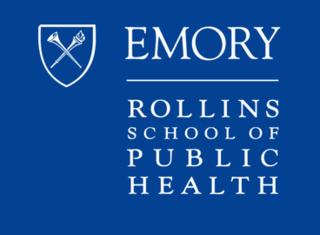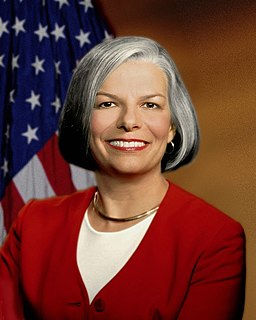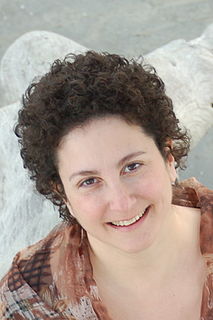Related Research Articles

The Centers for Disease Control and Prevention (CDC) is a national public health institute in the United States. It is a United States federal agency, under the Department of Health and Human Services, and is headquartered in Atlanta, Georgia.

The Rollins School of Public Health (RSPH) is the public health school of Emory University. Founded in 1990, Rollins has more than 1,100 students pursuing master's degrees (MPH/MSPH) and over 150 students pursuing doctorate degrees (PhD). The school comprises six departments: Behavioral, Social, and Health Education Sciences (BSHES), Biostatistics (BIOS), Environmental Health (EH), Epidemiology (EPI), Global Health (GH), and Health Policy and Management (HPM), as well as an Executive MPH program (EMPH).

Julie Louise Gerberding is an American infectious disease expert and was the first woman to serve as the director of the U.S. Centers for Disease Control and Prevention (CDC). She is currently the executive vice president for strategic communications, global public policy & population health and the chief patent officer at Merck.

The University of Texas Health Science Center at Houston (UTHealth) is a public academic health science center in Houston, Texas. It was created in 1972 by The University of Texas System Board of Regents. It is located in the Texas Medical Center, the largest medical center in the world. It is composed of six schools: McGovern Medical School, The University of Texas MD Anderson Cancer Center UTHealth Graduate School of Biomedical Sciences, UTHealth School of Dentistry, Cizik School of Nursing, UTHealth School of Biomedical Informatics and UTHealth School of Public Health.

Howard Kyongju Koh is the former United States Assistant Secretary for Health for the U.S. Department of Health and Human Services (HHS), after being nominated by President Barack Obama and confirmed by the U.S. Senate in 2009.
David F. Duncan is president of Duncan & Associates, a firm providing consultation on research design and data collection for behavioral and policy studies. He is also Clinical Associate Professor in the Department of Community Health at Brown University School of Medicine.
Dr. Robert J. McDermott received his B.S. in zoology from the University of Wisconsin–Madison in 1975. He subsequently earned his M.S. in 1977 and his Ph.D. in 1981, both in health education/curriculum and instruction from the same school. In 1981 he joined the faculty of the Department of Health Education at Southern Illinois University, Carbondale as an assistant professor. He was promoted to associate professor in 1985. While at SIUC he studied epidemiology under Robert Gold, David Duncan, and other notables.

Erica Frank is a U.S.-born educational innovator, physician, medical and educational researcher, and public health advocate. Since 2006, she has been a Professor and Canada Research Chair in the School of Population and Public Health, and the Department of Family Practice at the University of British Columbia (UBC). Her medical specialty is Preventive Medicine.

Perry N. Halkitis is an American of Greek ancestry public health psychologist and applied statistician known for his research on the health of LGBT populations with an emphasis on HIV/AIDS, substance use, and mental health. Perry is Dean and Professor of Biostatistics, Health Education, and Behavioral Science at the Rutgers School of Public Health. Between 1998 and 2017, Perry was faculty at New York University, serving in a variety of capacities, the last of which was Senior Association Dean for Academic and Faculty Affairs at the College of Global Public Health and Professor of Global Public Health, Applied Psychology, and Medicine. He is also the founder and director of the Center for Health, Identity, Behavior, and Prevention Studies (CHIBPS) at New York University, a bio-behavioral funded research site funded that also serves as a training site for public health, psychology, medical and student scholars working in the arena of LGBT health disparities informed by a theory of syndemics.

John P. McGovern was an American allergist, investor and philanthropist. He established the McGovern Allergy Clinic in Houston, Texas, created the Texas Allergy Research Foundation and the John P. McGovern Foundation, and co-founded the American Osler Society.
Noreen M. Clark was the Myron E. Wegman Distinguished University Professor, Director of the Center for Managing Chronic Disease, Professor of Health Behavior & Health Education, and Professor of Pediatrics at the University of Michigan. From 1995-2005 she served as Dean of Public Health and Marshall H. Becker Professor of Public Health at the University of Michigan. She was interested in systems, policies and programs that promote health, prevent illness, and enable individuals to manage disease.
Dr. José F. Cordero is a pediatrician, epidemiologist, teratologist, Head of the Department of Epidemiology and Biostatistics at the University of Georgia's College of Public Health, and former Dean of the Graduate School of Public Health at the University of Puerto Rico. Cordero was an Assistant Surgeon General of the United States Public Health Service and the founding director of the National Center on Birth Defects and Developmental Disabilities (NCBDDD) at the Centers for Disease Control and Prevention (CDC) in Atlanta, Georgia. In 2017, Cordero was awarded the Sedgwick Memorial Medal from the American Public Health Association.
Mary Guinan, Ph.D., M.D. is the dean at the School of Community Health Sciences at the University of Nevada, Las Vegas. Guinan is known for her work in the initial investigation of the HIV/AIDS epidemic for the Centers for Disease Control and Prevention (CDC). The book and subsequent film And the Band Played On, by Randy Shilts documented her efforts regarding these issues; she was played by Glenne Headly. Later on, she became the first female State Health Officer appointed to the Nevada government. Guinan also became president of the American Medical Woman's Association, after 40 years of membership.
Robert Palmer Beasley was a physician, public health educator and epidemiologist whose work on hepatitis B involved extensive investigations in Taiwan. That work established that hepatitis B virus (HBV) is a primary cause of liver cancer and that hepatitis B virus is transmitted from mother to infant during childbirth. Beasley and his colleagues also proved that HBV mother-to-infant transmission is preventable by at-birth vaccination. Due to this work, the World Health Assembly designated HBV as the seventh global vaccine in 1992. He later became the author of HBV immunization policies for the World Health Organization.

Mary Jane Rotheram-Borus is a licensed clinical psychologist and professor with the University of California, Los Angeles, Department of Psychiatry and Biobehavioral Sciences. Rotheram is the professor-in-residence in the Semel Institute for Neuroscience and Human Behavior. She is the Director of the Global Center for Children and Families at UCLA and the former director of the Center for HIV Identification, Prevention, and Treatment Services.

Susan Blumenthal is an American physician, global health expert, psychiatrist and public health advocate. With more than two decades of service as a senior government health leader in the administrations of four U.S. presidents, Blumenthal served as the first Deputy Assistant Secretary for Women's Health and Director of the Office on Women's Health within the U.S. Department of Health and Human Services (HHS), as well as Assistant Surgeon General of the United States and Senior Global Health Advisor within the HHS. She also was a Research Branch Chief at the National Institutes of Health (NIH), and the Chair of the NIH Health and Behavior Coordinating Committee. As of 2016, she has served as the Senior Medical and Policy Advisor at amfAR, The Foundation for AIDS Research, a Senior Fellow in Health Policy at New America, and a Clinical Professor at Tufts and Georgetown Schools of Medicine. Blumenthal is the Public Health Editor of the Huffington Post. She is married to United States Senator Ed Markey.

Thomas J. Coates is the Director of the multi-campus University of California Global Health Institute, a UC-wide initiative established to improve health and reduce the burden of disease throughout the world. He is Professor Emeritus at the UCLA David Geffen School of Medicine and Founding Director of the UCLA Center for World Health, a joint initiative of the David Geffen School of Medicine at UCLA and UCLA Health, He has conducted extensive research in the realm of HIV and is the Michael and Sue Steinberg Endowed Professor of Global AIDS Research within the Division of Infectious Diseases at UCLA and Distinguished Professor of Medicine. Health-related behavior is of particular interest to Coates. Throughout his career as a health expert, his theory-based research has been focused on interventions aimed at reducing risks and threats to health
Simin Liu is an American physician researcher. He holds leadership positions internationally in the research of nutrition, genetics, epidemiology, and environmental and biological influences of complex diseases related to cardiometabolic health in diverse population. His research team has uncovered new mechanisms and risk-factors as well as developed research frameworks for diabetes and cardiovascular diseases. Liu's laboratory conducts research mainly in the United States, though the group has had research collaborations, teaching, and service activities in six of the Seven Continents.
David A. Sleet is an American scientist recognized for championing the application of behavioral science to unintentional injury prevention and helping to establish injury prevention as a global public health concern. He has published hundreds of articles and book chapters and was co-editor of the Handbook of Injury and Violence Prevention.; Injury and Violence Prevention: Behavioral Science Theories; Derryberry’s Educating for Health; and the international prize-winning World Report on Road Traffic Injury Prevention.

Camara Phyllis Jones is an American physician, epidemiologist, and anti-racism activist who specializes in the effects of racism and social inequalities on health. She is known for her work in defining institutional racism, personally mediated racism, and internalized racism in the context of modern U.S. race relations. During the COVID-19 pandemic, Jones drew attention to why racism and not race is a risk factor and called for actions to address structural racism.
References
- ↑ "Previous Sedgwick Memorial Medal winners". American Public Health Association. Retrieved 12 December 2017.
- Laflin, M. T., and Black, D. R. (2003). Viewpoint: Conversation with Lawrence W. Green, DrPH, FAAHB. American Journal of Health Behavior, 27(4), 466-468
- McDermott, R. J. (1999). Inside The Academy: Profiling Dr. Lawrence W. Green. American Journal of Health Behavior, 23, 3–6.
- Williams, R. M. Rx: social reconnaissance. Foundation News, 31(4), 24–29.